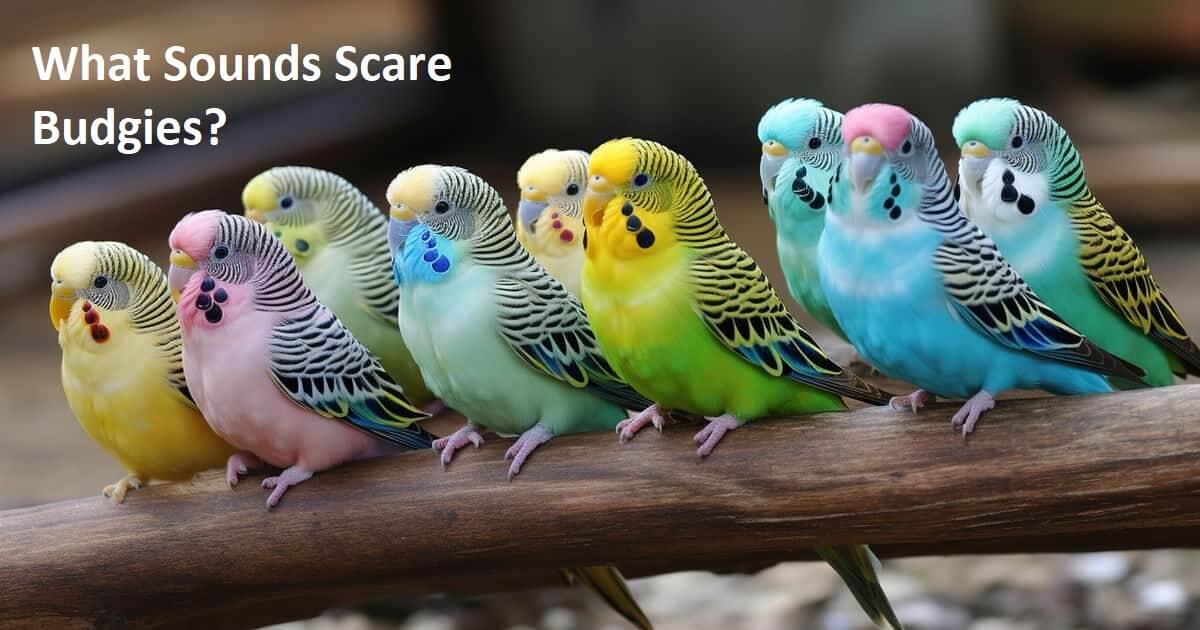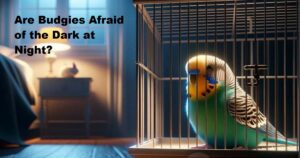What Sounds Scare Budgies?
Budgies are often scared by loud, sudden noises like thunderstorms, fireworks, vacuum cleaners, barking dogs, and loud music. High-pitched or unfamiliar sounds, like alarms, sirens, and even specific electronic devices, can also frighten them. Consistent exposure to these sounds may cause stress and anxiety in budgies.
Did you know that birds, especially our buddies and the budgies, have super keen hearing? They’re always tuning in to the world around them. Usually, they’re cool as cucumbers, but some sounds ruffle their feathers. So, knowing what sounds scare budgies helps owners keep them calm and safe.
However, let’s explore some common sounds that may scare these delightful feathered pets and learn how to minimize their impact. By being aware of these potential sources of fear, you can ensure a peaceful and stress-free environment for your budgies.
What Sounds Scare Budgies? Common Sounds That Scare Budgies
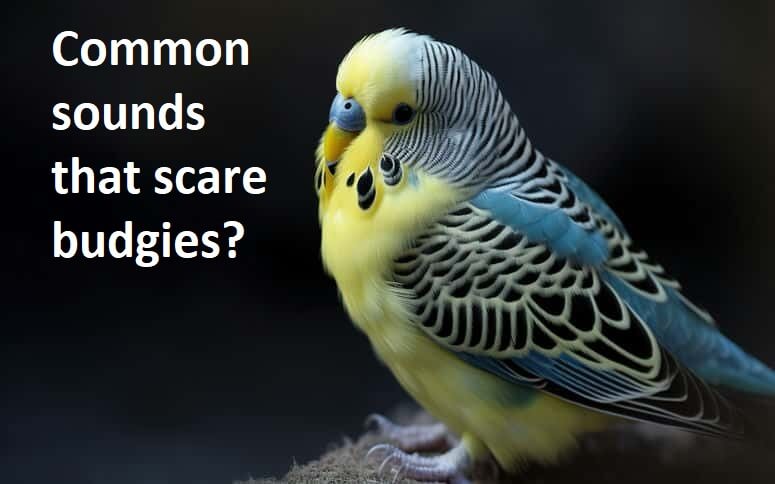
Budgies, like many birds, can be frightened by various sounds, especially those that are loud or unfamiliar. Here are some common sounds that might scare budgies:
Loud Noises
- Thunderstorms: The loud booms of thunder can terrify budgies and make them anxious.
2. Fireworks: The sudden loud explosions and bright lights of fireworks can startle and scare budgies.
High-pitched Sounds
3. Car Alarms: The sharp and continuous sound of a car alarm can be distressing for budgies.
4. Whistles: High-pitched whistles can be unsettling for budgies, as they have sensitive hearing.
5. Alarm sounds: Loud and piercing alarms, such as smoke detectors or doorbells, can startle budgies due to their sensitive auditory system.
Household Sounds
6. Vacuum Cleaners: The loud noise and the movement of a vacuum cleaner can disturb and frighten budgies.
7. Blenders: The loud whirring noise of blenders can cause budgies to become anxious.
8. Power tools: The sound of power tools, such as drills or saws, can distress budgies. They associate the noise with unfamiliar and potentially dangerous situations.
Predator Sounds
9. Dogs Barking: The aggressive and loud barking of dogs can trigger fear in budgies.
10. Cats Meowing: Budgies instinctively fear the sound of cats meowing due to their natural predator-prey relationship.
11. Predator calls: Budgies have an instinct for self-preservation. Hearing sounds resembling predators, such as cats or birds of prey, can trigger their fear response.
12. Human imitations of bird calls: Budgies may feel threatened by human imitations of bird calls. They see them as potential rivals or threats.
Unfamiliar Sounds:
13. Construction Noise: The loud sounds of drilling and hammering from nearby construction sites can cause budgies stress and fear.
14. Sirens: Sirens can startle budgies and make them anxious. The wailing sound of sirens from emergency vehicles is the cause.
15. Construction Noises
While construction noises may be expected in our daily lives, they are unsettling for budgies. The constant hammering, drilling, and heavy machinery sounds can create an environment of stress and fear for these delicate birds.
However, it’s crucial to recognize that prolonged exposure to construction noises can negatively impact a budgie’s overall well-being.
Moreover, being mindful of the sounds in your budgie’s environment is essential. Take steps to minimize any potential sources of fear or anxiety. Providing a calm and quiet space for your budgie will help them feel safe and secure.
Negative Effects Of Stressful Sounds On Budgie’s Health And Well-being
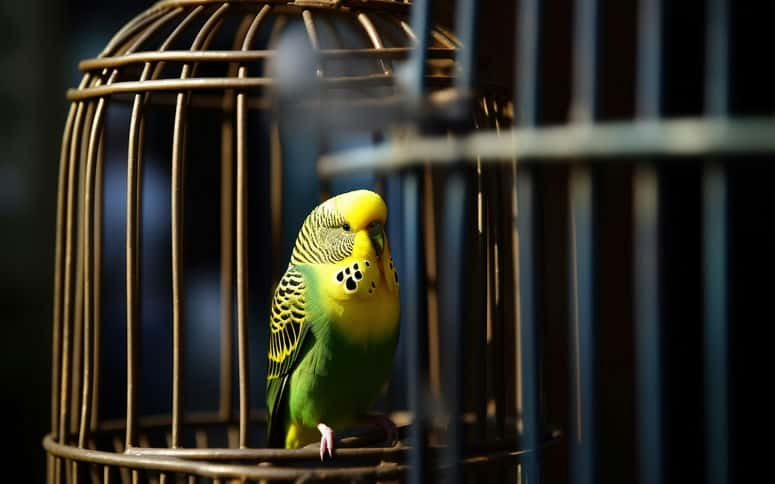
When budgies hear stressful sounds, it can cause problems:
- Behavior Changes: They might act scared, bite, or yell.
- Feather Plucking: They can start pulling out their feathers.
- Weaker Immune System: Stress can make them get sick more easily.
- Eating Less: They might not eat as much, which isn’t good for their health.
- Sleep Problems: Loud noises can stop them from sleeping well.
- Breeding Issues: Stress can cause problems with laying eggs or with baby birds.
Are Budgies Loud?

Are Budgies Loud? If you consider adding a budgie to your family, you may wonder about their noise levels. Budgies, or parakeets, are known for their cheerful chirping and melodic singing.
While they are not considered excessively noisy pets, they do vocalize throughout the day, especially during peak activity times. Budgies enjoy communicating with their owners and each other, which means you can expect to hear them chirping, whistling, and even mimicking sounds they hear in their environment.
However, with proper training and socialization, you can teach your budgie to control the volume of their vocalizations. Providing them with stimulating toys and maintaining their mental and physical well-being can also help minimise excessive noise.
So, while budgies may be vocal companions, they can be a delightful addition to your home without causing overwhelming noise.
Do Budgies Like Loud Music?
Budgies don’t like loud music because their hearing is compassionate. Loud music can upset them and hurt their ears. Here’s why:
- Sensitive Ears: Budgies hear better than people. They can hear more sounds, so loud noises can be too much for them and even damage their hearing.
- Stress and Anxiety: Loud music can make budgies feel scared or worried. They need a quiet place to be happy.
- Disturbed Sleep: They need to sleep well. Loud music can keep them awake and cause health problems.
- Song Confusion: Budgies like to sing. Loud music can mix them up and make it hard for them to hear their own songs or talk to each other.
But remember, each budgie is different. Some might be okay with soft music, but others get upset even if the music isn’t very loud. It’s important to watch how your budgie reacts to music.
How To Minimize Stressful Sounds For A Calmer Budgie Environment?

Here are some strategies to help your budgies feel more at ease in their surroundings.
1. Soundproofing Strategies
Creating a quiet environment is crucial to keeping budgies relaxed. Consider the placement of your budgie’s cage—avoid locating it near noisy appliances or high-traffic areas.
Consider using acoustic panels or thick curtains to absorb excess noise and vibrations. Identifying and minimizing noise sources can help your budgie feel more comfortable in their living space.
2. Relaxing Sounds And Music For Budgies
Research shows that certain types of music and sounds can calm budgies. Classical, soft instrumental music and ambient nature sounds, such as gentle rain or chirping birds, are often favorites among budgies.
Play these soothing sounds at a low volume to encourage a calming atmosphere for your budgie. It’s also essential to observe their reaction—if they seem agitated, switch to a different type of music or sound to find what works best for their relaxation.
3. Using Words To Calm Scared Budgies
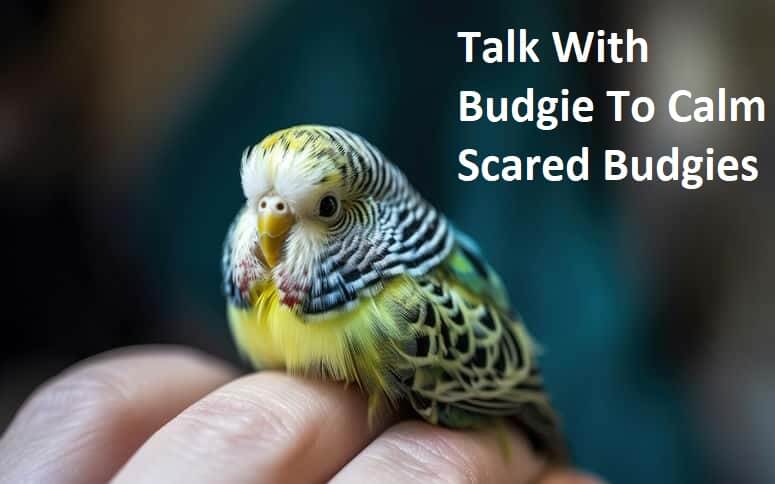
Budgies are susceptible and easily frightened birds. So, as a budgie owner, it’s crucial to create a calm and soothing atmosphere for your feathered friend. One effective way to do this is by using words to calm scared budgies.
4. Choosing Gentle And Soothing Words
These words should create a sense of security and reassurance for your budgie. Avoid using harsh or loud words that may further frighten your pet.
Some gentle and soothing words that can help calm your budgie include:
- “Calm down”
- “It’s okay.”
- “You’re safe.”
- “I’m here”
- “Relax”
Using these words in a soft and soothing tone can help your scared budgie feel more at ease in their surroundings.
5. Creating A Calming Atmosphere
To support your budgie’s well-being, creating a calming atmosphere in their living space is essential. This can include:
- Dimming the lights: Bright lights can be overwhelming for budgies. Opt for softer lighting to create a more relaxed atmosphere.
- Playing soft music: Gentle instrumental music or nature sounds can help mask any external noises that may startle your budgie.
- Controlling the temperature: Budgies thrive in moderate temperatures. Ensure their surroundings are neither too hot nor too cold.
Establishing a peaceful environment can reduce your budgie’s stress and fear.
6. Training Budgies To Associate Certain Words With Calmness
Training budgies to associate certain calming words with a state of calmness can be a helpful tool in easing their anxiety. Repetition and positive reinforcement are essential in this process.
Here are some steps to train your budgie to associate certain words with calmness:
- Choose a quiet and comfortable room for training.
- Select a specific calm word, such as “relax” or “peace.”
- Sit close to your budgie’s cage and softly say the chosen word.
- Repeat the word multiple times, delivering it calmly and soothingly.
- When your budgie appears relaxed or calm, provide positive reinforcement such as treats or gentle petting.
By consistently associating the chosen word with calmness and a positive experience, your budgie will learn to associate it with feeling safe and secure.
What Sounds Do Budgies Like?

Budgies, known for their friendly and curious nature, enjoy a variety of sounds that can stimulate their mental activity and mimic their natural environment.
Here’s a table outlining some sounds that budgies typically like:
| Type of Sound | Description | Reason for Preference |
|---|---|---|
| Classical Music | Soft, melodic tunes | Soothing and calming, it resembles natural harmonies |
| Nature Sounds | Sounds of rain leaves rustling, water flows | Mimics their natural environment, promotes calmness |
| Human Voices | Calm talking, singing | Social interaction mimics flock communication |
| Chirping Sounds | Recordings of other birds | Encourages social interaction, familiarity |
| Whistling | Simple whistling tunes | Engaging and interactive, it encourages mimicry |
Budgies react positively to these sounds, which create an engaging and comforting environment. However, it’s essential to keep the volume moderate to prevent overstimulation.
Frequently Asked Questions Of What Sounds Scare Budgies?
How Do Budgies React To Scary Sounds?
Can Scary Sounds Have Long-term Effects On Budgies?
Should I Avoid Exposing My Budgie To Any Scary Sounds?
Sum Up
To make sure your budgies feel safe and comfortable, it’s essential to understand what sounds scare them. Loud noises, sudden movements, and high-pitched sounds can all be potential sources of fear for these delicate birds.
By creating a peaceful and quiet environment, you can ensure your budgies live a stress-free life. Remember, their well-being is the key to a harmonious relationship between you and your feathered friends.

